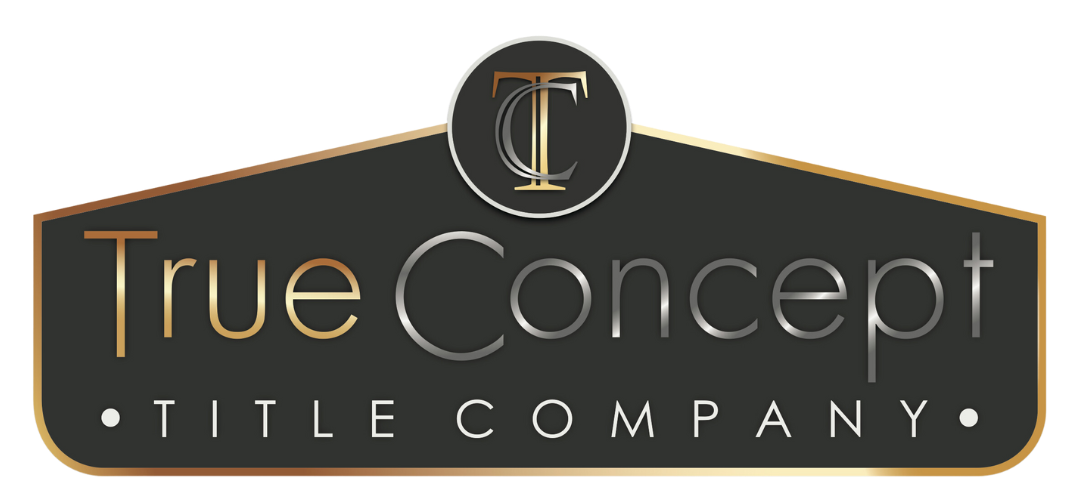Closing Checklist: Steps to Take Before Closing on a Home
Whether you’re a first-time homebuyer or simply need a refresh on the process, closing day is an eagerly anticipated finish line that you want to pass with no bumps and/or bruises. There are a lot of steps to take when closing on a home, and you need to cover all your bases.
To help you manage the process, our team at True Concept Title has compiled every action item in one checklist:
- Square away contingencies
- Clear the title (with our team at True Concept!)
- Acquire a final mortgage approval
- Review the closing disclosure
- Complete a final walk-through
- Bring the right documents
If you follow all of these steps, you’re sure to have a better closing experience. Complete with the satisfying weight of your new keys in your pocket! Scroll for the details on each step to know what you can expect.

Step #1: Carry Out All Contingencies
When you buy a house, there are certain things you may have to do before the real estate transaction can be declared official, called contingencies. The following common contingencies will likely show up in your purchase agreement:
Home Inspection Contingency
Before buying a home, you will want to have it professionally inspected to make sure there aren’t any major issues that may result in a huge hit to your wallet.
You may feel tempted to avoid the average $300 to $500 fee of a home inspection, but we strongly discourage giving into that impulse. Home inspections will help you avoid issues that cost thousands.
Appraisal Contingency
You likely don’t want to pay more than what your future home is deemed worth by a professional. During an appraisal, a third party hired by your mortgage lender will analyze and determine the fair market value of the property.
If this value is less than the listing cost, this contingency allows you to back out of the deal and get back your earnest money deposit.
Financing Contingency
If your mortgage agreement fails to be approved, you have an allocated period of time to back out or obtain another loan.
Many people waive the contingencies to make their offer more desirable. We don’t recommend skipping them as they help your peace of mind.
Step #2: Clear Any Clouds on the Title with True Concept
When you purchase a new property, the title will be transferred to you to establish your legal ownership. Before you close, your mortgage lender will likely require a title search to make sure there are no issues clouding the title.
Even if not required by your mortgage lender, we highly recommend a thorough title search so you don’t risk losing your property or owing thousands in legal fees. You’ll also need to purchase title insurance to protect your ownership moving forward in case errors in public record or unanticipated claims on the title rise to the surface.
True Concept Title is armed with the experience and commitment to help you through the closing process. Call our national title & escrow team today – (813) 263-7168.
Step #3: Get Your Mortgage Loan Approved
Even though you’ve made a down payment, your home loan needs to be approved by an underwriter who will prove you have truthfully represented your finances. After ensuring all is well with your credit score, your home appraisal, and your financial portfolio, you will at long last be approved for your loan.
Don’t make any large purchases that must be financed too close to closing, this would hurt your credit score and be a red flag to your underwriter.
Step #4: Review the Closing Disclosure
If you’re receiving a mortgage loan to pay for your new house, make sure you read the fine print! This official ‘closing disclosure’ will include specific details such as:
- Your exact mortgage payments
- Terms of the loan including interest rate and duration
- Additional fees called closing costs (around 2-7% of your home’s price)
Compare this disclosure to your original loan estimate and note any discrepancies to discuss with your lender.
Step #5: Complete a Final Walk-Through
Before you finally close, it’s a good idea to complete a walk-through of the home within a day beforehand. This will allow you to ensure the previous owners have vacated and that the home is in the agreed upon condition.
A walk-through the day before closing gives you the opportunity to ensure that the property is in the agreed upon condition and free of surprises.
Step #6: Bring the Right Documents
On closing day, it’s essential that you have the right documents for things to go smoothly. This includes:
- Proof of homeowners insurance
- The contract with the seller
- Home inspection reports (if you had one completed)
- All loan paperwork
- Government-issued photo ID
You’ll likely be at the table signing paperwork for a while, so be prepared to get comfortable!
Learn More > A Title Company’s Role During Closing

Choose True Concept for a Smooth Close
The title company plays a huge role in any home buying process, providing the documentation and handling the money to set in stone your new purchase. It’s crucial that you work with a title company you feel safe trusting and opening up to.
Connect with True Concept Title for your next real estate purchase. We can honestly say you won’t be disappointed. Our commitment to our clients and our attention to accuracy is why we’re the best in the business. Reach out today to learn more about our services.










